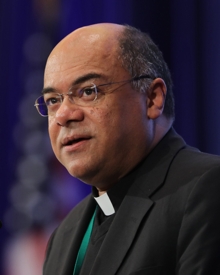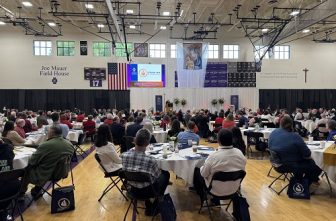Catholics must educate themselves on the Church’s teaching on racism and nurture the passion to respond to racism — both personal and structural — with the same vigor that they respond to other attacks against the sanctity of life, such as abortion, capital punishment and euthanasia, Bishop Shelton Fabre said during a Sept. 9 webinar organized by the Minnesota Catholic Conference.
Racism is a life issue, he said, referring to the U.S. bishops’ 2018 pastoral letter against racism, “Open Wide Our Hearts: The Enduring Call to Love.” In that letter, the bishops unequivocally stated that racism is a life issue, Bishop Fabre said.

“As disciples of Jesus Christ, we must assist in dismantling racism as it exists in people’s hearts, in our society and even in our Church,” said Bishop Fabre, leader of Houma-Thibodaux in southern Louisiana and chairman of the U.S. Conference of Catholic Bishops’ Subcommittee for African American Catholics, as well as a member of its Committee on Cultural Diversity in the Church.
The police-custody death of George Floyd, an African American, May 25 in Minneapolis sparked protests across the country and discussions about ongoing racial inequity and injustice in America. MCC held the forum to provide the chance for formation and reflection on these issues and how the Church can respond. Titled “Open Wide our Hearts: The Catholic Church Confronts Racism,” the webinar included a welcome from Archbishop Bernard Hebda and a panel of Black Catholic leaders. The session was held primarily for priests, deacons, educators and lay ecclesial ministers, but was open to the public.
For far too long, racism has blocked people from fully being the community that God created all to be, said Bishop Fabre, who is Black. It’s not only a struggle in the realm of civil law, he said, but a struggle within the human heart.
“Racism has no place in the Christian heart, and racism is a moral problem that requires a moral remedy, a transformation of heart that impels us to act,” he said.
He said Catholics need to seek the conversion of their own hearts and the hearts of others to truly overcome racism.
That comes with engaging the world, he said, including those on the peripheries of people’s limited view, and seeking dialogue with those who are victims of racism, first to understand their suffering and then by working to resolve it.
Touching on the question of the sometimes fraught relationship between the Black Lives Matter movement and the Catholic Church, Bishop Fabre said the sentiment the movement expresses is about great pain and suffering in the Black community, and that suffering needs the Church’s focus.
It is possible to support the sentiment expressed by Black Lives Matter without supporting the national organization, which has espoused things that the Church cannot support, he said. However, discussions about Black Lives Matter sometimes divert from the real focus, he said, which is addressing racism right now because people in the Black community are hurting, and people are losing their lives.
“When we say ‘Black lives matter,’ it means that, right now, as we have seen played out in so many different ways … there’s pain, there’s suffering, there’s outrage and anger in the Black community,” he said. “It all roots itself in racism.”
Prayer changes people, he said, and people change situations.
“Authentic prayer always leads us to constructive action, and our constructive action must always be guided by authentic prayer,” he said. “As people of faith, it is important that we undertake our efforts to overcome racism guided by prayer.”
He added: “Prayer is often dismissed in these times as having no effect, but as people of faith, we know the power of prayer because we ourselves have experienced it.”
The webinar included a panel discussion with Damon Clarke Owens, an international speaker and evangelist; Loralean Jordan, an advocate for social justice at St. Peter Claver in St. Paul and the Twin Cities community; and Lannette Turicchi, a Catholic convert who has worked at The Walt Disney Company and now focuses on public speaking and media projects.
Jordan said pastoral letters from the bishops, including those describing racism as a sin, are “well and good, but what we need is action. We need bold action that backs up the statement that racism is a sin that will not be tolerated in the Catholic Church.”
Parishes need to facilitate what can be a tough conversation around race, she said.
“We need to check ourselves to see how we are treating people who don’t look like us,” she said. “Are we as a Church open to the stranger? Do we follow social justice teaching in its entirely, not just picking and choosing what feels comfortable to us?”
Owens described the need to see people through “the lens of God” — “not just racism in an isolated sense, but to see the root of it as our inability to see one another as an … image and likeness of God.”
In recalling news stories of Black men shot by police, Turicchi asked herself what the issue is with racism, the police and Black men. She concluded that America has a “Blackness issue.”
“If there is a fear of Black people, the darker (the) skin, the more fear you have,” she said.
But the Black community also has to take responsibility, she said, calling education the great equalizer.
She cited multiple statistics on lagging reading abilities for Black children. Forbes magazine, for example, reported in a June 6 commentary that in 2019, only 18% of Black fourth-graders scored proficient or above in reading on national tests.
“Reading means freedom,” Turicchi said. “Reading means prosperity. Reading means power. … Reading well is the essential step to solving almost every problem in the Black community … Black people must be responsible for teaching children to read.”
She advised parents to demand change in local schools and not vote for people who don’t represent their needs. Apply to Catholic or charter schools, she said, and make education as important as the mantra “Black Lives Matter.”
Catholics of all races need to come together to help break down this issue of education, she said. “Lack of education is the systemic racism of today.”
Turicchi added that Catholics need to support their local Catholic schools so they become the centers of change for ending racism.
“Black Catholics need to invite their families to church,” she said. “The Black community has always had its roots in religion and God. Catholic parishes need to be more welcoming to African Americans and people of color.”
She noted that all three panelists had different backgrounds and lifestyles, but they shared their Catholic faith.
“Reach out and find common ground with people and stop worrying about what makes you different from them,” she said. “If you took color away … (and suddenly) we’re all the same color, the next issue would be well, you’re fat and I’m skinny, and you’re rich and I’m poor, and you live in a better house than I do.”
People need to stop name calling and get back to “the heart of it,” she said.
People have more in common than we do apart, she said. “We have to start focusing on what’s in our hearts and believe that God can soften hearts, and the Holy Spirit can move mountains.”
The only way people are going to deal effectively with racism, Turicchi said, is to invite the Holy Spirit in. “This is bigger than all of us,” she said. “We can’t change 1,000 people, but we can have a conversation, and conversations do change lives.”
Archbishop Hebda opened the session with a prayer, including references to St. Peter Claver, a 17th-century Spanish Jesuit missionary to African slaves in the Caribbean, whose feast was celebrated that day. He is a patron of African Americans and interracial justice.
“May we, like St. Peter Claver, see our neighbors as true brothers and sisters, recognizing that you created one human family and endowed each person with great dignity,” he said.
More than 500 people were registered for the event. The Minnesota Catholic Conference is the public policy voice of the state’s Catholic bishops. A recording of the webinar is available at the MCC website: mncatholic.org/openwideourhearts.




